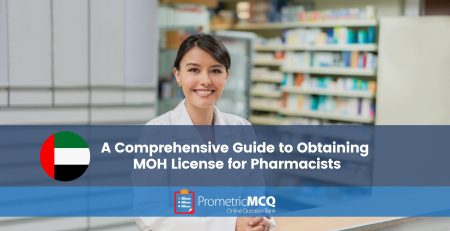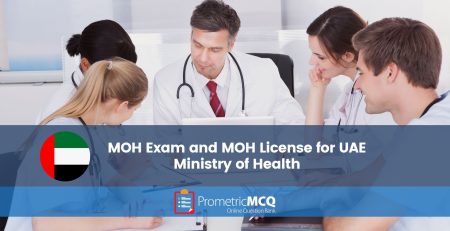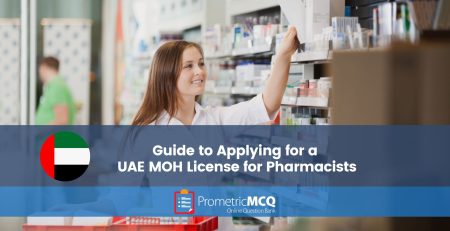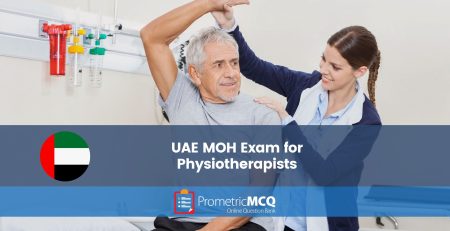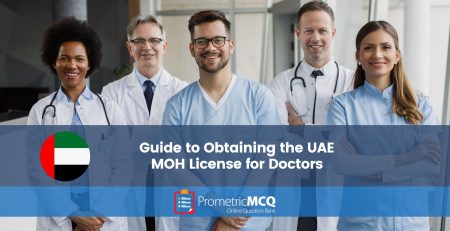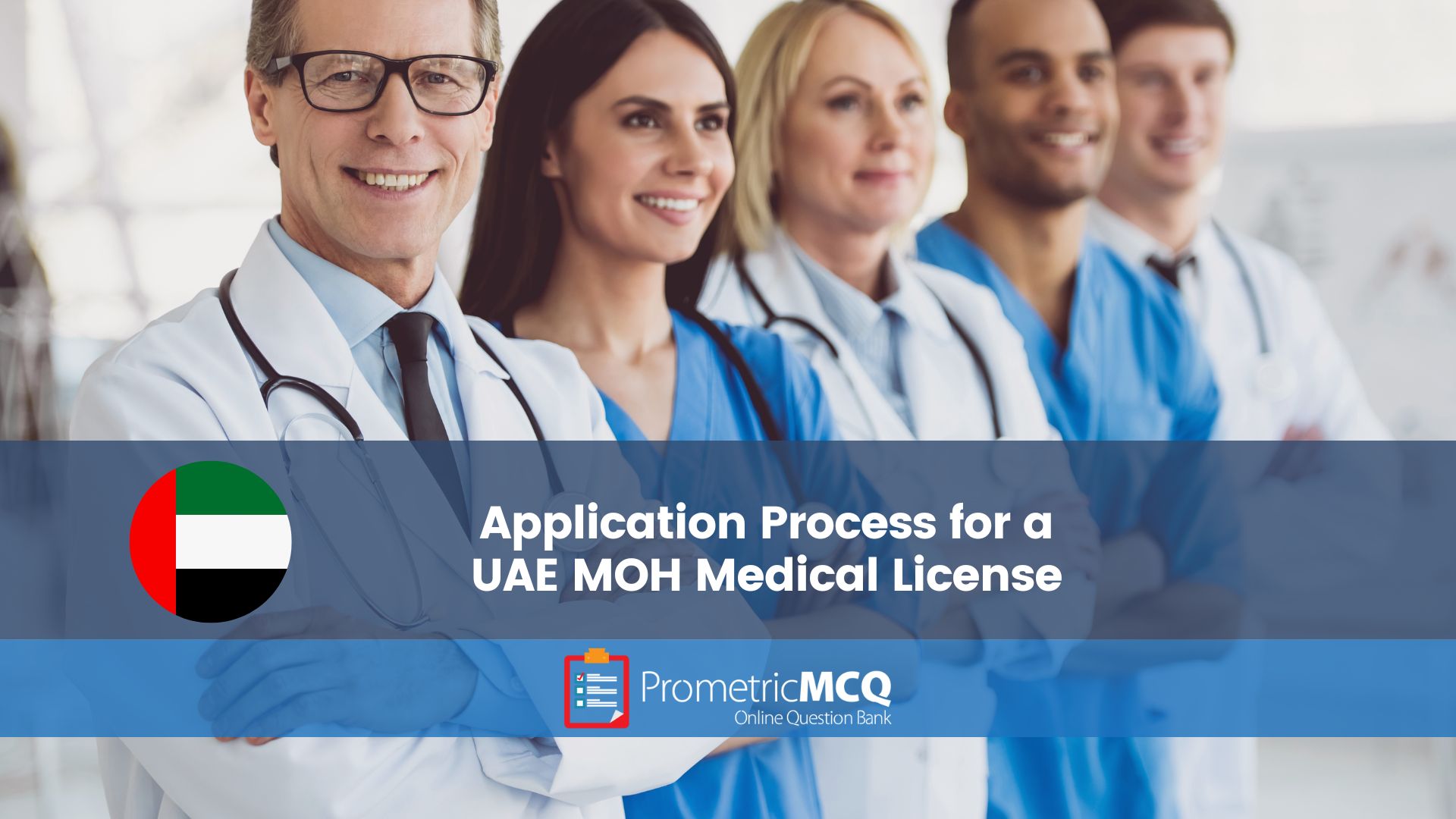
Application Process for a MOH Medical License
Webmaster2024-03-29T14:04:02+00:00Are you a healthcare professional looking to unlock the next chapter of your career journey by securing a MOH Medical License? Navigating the application process for a MOH License can be both crucial and intricate, making it essential to have a thorough understanding of the requirements and procedures involved.
This comprehensive guide dives deep into the pivotal phase of obtaining a MOH Medical License, serving as your golden ticket to a fulfilling realm of healing and making a real difference in the world of healthcare.
Table of Contents
ToggleMOH Medical License
Obtaining a MOH (UAE Ministry of Health) Medical License is a crucial milestone for any medical professional. This esteemed credential not only signifies your qualifications and skills but also opens doors to a fulfilling career in the healthcare profession. Let’s delve into the significance of a MOH Medical License and understand the process of acquiring one.
A MOH Medical License is your permission slip to practice medicine in the UAE. It acts as a testament to your thorough understanding of the MOH regulations and commitment to upholding the highest standards of care. With this key credential, you become a trusted healthcare provider, responsible for the well-being of individuals and contributing to the overall betterment of the community.
The Ministry of Health plays a pivotal role in regulating and monitoring the medical profession, ensuring that healthcare providers adhere to rigorous standards. By obtaining a MOH Medical License, you position yourself as a qualified practitioner who has met the required educational qualifications, practical experience, and other prerequisites set by the ministry.
Navigating the application process for a MOH Medical License may seem like a labyrinth of regulations, but with the right guidance and thorough preparation, you can successfully navigate this bureaucratic hurdle. The process involves submitting various documentation, including academic transcripts, proof of clinical experience, and letters of recommendation.
The MOH Medical License is more than just a piece of paper; it is an endorsement of your commitment to ongoing learning and professional development. It signifies your dedication to staying updated with the latest advancements in the ever-evolving landscape of healthcare.
Embarking on the journey to obtain a MOH Medical License is worth undertaking. It opens up a fulfilling realm of healing, where you can make a real difference in people’s lives. So, take the first step and embark on this transformative journey towards a rewarding medical career.
Health Care Consultant in Dubai
In Dubai, the role of a health care consultant holds immense significance in the thriving healthcare industry. These professionals provide valuable guidance and expertise to healthcare organizations and providers, ensuring the highest standards of care for residents and patients. To excel in this role, obtaining a MOH Medical License becomes an essential requirement.
A MOH License serves as a testament to the consultant’s thorough understanding of the MOH’s commitment to healthcare regulations and standards. It acts as a golden ticket, granting access to opportunities in the medical profession and enabling consultants to make a positive impact on the well-being of individuals and the overall realm of healing.
Being a healthcare consultant in Dubai requires a thorough understanding of the latest advancements in the ever-evolving landscape of healthcare. By acquiring a MOH Medical License, consultants demonstrate their dedication to staying updated with the most recent developments and providing the highest level of care.
Obtaining this key credential is not only a pivotal phase in a consultant’s career, but it also demonstrates their endorsement of commitment to ongoing learning and professional development. A MOH Medical License serves as a permission slip to navigate the labyrinth of regulations and bureaucratic hurdles, enhancing the consultant’s chances of success in this competitive field.
By acquiring the right guidance, showcasing relevant experience, and adhering to the rigorous standards set by the MOH, healthcare consultants in Dubai can truly make a real difference. The MOH Medical License is not just a mere piece of paper; it symbolizes their dedication to the noble pursuit of providing exceptional healthcare services and contributing to the well-being of individuals and the community as a whole.
Remember, a MOH Medical License is worth undertaking for anyone aspiring to thrive in the fulfilling realm of healthcare consultancy in Dubai. It is a transformative step that opens doors to a world of opportunities and allows consultants to be active participants in shaping the future of healthcare delivery.
Process of MOH Medical License
Obtaining a MOH License is the key to unlocking a rewarding and impactful career in the healthcare profession. This section will guide you through the step-by-step process of obtaining a MOH License for Doctors, ensuring you have a thorough understanding of the application process and the required documentation.
Step 1: Research and Preparation
- Start by familiarizing yourself with the Ministry of Health (MOH) and their role in regulating the medical profession.
- Ensure that you meet the eligibility criteria for obtaining a MOH Medical License, including the necessary educational qualifications and practical experience.
- Thoroughly understand the documentation requirements and gather all the necessary paperwork, such as academic transcripts, proof of clinical experience, and letters of recommendation.
Step 2: Online Application
- Visit the MOH official website and navigate to the application portal.
- Create an account and fill out the online application form with accurate and up-to-date information.
- Attach all the required documents in the specified format and ensure their authenticity.
Step 3: Application Review and Processing
- Submit your application and await the review process by the MOH.
- The processing time may vary, so it’s important to regularly check the status of your application online or through the provided contact channels.
- Be prepared to provide any additional documents or information requested by the MOH during the review process.
Step 4: Verification and Evaluation
- The MOH will carefully review your application, verifying the authenticity of the submitted documents and evaluating your qualifications.
- They may conduct interviews or assessments to assess your competency and suitability for a MOH Medical License.
Step 5: License Issuance
- If your application is successful, you will receive the precious “golden ticket” – your MOH Medical License.
- This key credential endorses your commitment to upholding the high standards of care expected in the medical profession.
Remember, obtaining a MOH Medical License is not just a bureaucratic hurdle but a pivotal phase in your medical career. With the right guidance and thorough preparation, you can increase your chances of success and make a real difference in the ever-evolving landscape of healthcare.
The Application Process
Obtaining a MOH Medical License is a significant achievement for any medical professional looking to make a positive impact in the world of healthcare. To embark on this fulfilling journey, it is crucial to understand the application process for a MOH Medical License thoroughly.
Eligibility Criteria
Before beginning the application process, ensure that you meet the eligibility criteria set by the Ministry of Health. These criteria typically include:
- Possession of a valid medical degree from a recognized institution
- Completion of a specified period of practical experience, which varies depending on the specialization
- Proficiency in the local language, if applicable
Submission Requirements
To initiate your application, gather the necessary documentation, which may include:
- Academic Transcripts: Provide official transcripts of your medical education, including degrees and diplomas obtained.
- Letters of Recommendation: Obtain letters of recommendation from reputable medical professionals who can endorse your expertise and skills.
- Proof of Clinical Experience: Submit evidence of your practical experience, such as certificates, work records, or a logbook.
Processing Time
The processing time for a MOH Medical License can vary, but it is essential to stay patient. Typically, the Ministry of Health will review your application and conduct background checks to ensure compliance with healthcare regulations and standards.
Remember, obtaining a MOH Medical License is a pivotal phase in your medical career, and meticulous preparation is key. By adhering to the application process diligently, you enhance your chances of success.
Next, we will delve into the intricacies of navigating the documentation maze, where we provide guidance on the specific requirements and establish the confidence needed to breeze through the bureaucratic hurdles.
Stay tuned for our next section on Navigating the Documentation Maze.
Navigating the Documentation Maze
Obtaining a MOH Medical License requires meticulous attention to detail and a thorough understanding of the documentation requirements. To successfully navigate this crucial step, aspiring medical professionals must gather and submit the necessary paperwork. Here is a comprehensive guide to help you through the documentation maze:
Academic Transcripts
- Obtain certified copies of your academic transcripts from your medical school. These transcripts should highlight your educational qualifications and demonstrate the depth of your medical knowledge.
- Ensure that your transcripts are complete and include all necessary information, such as course names, grades, and credit hours.
- Double-check for any specific formatting requirements outlined by the Ministry of Health (MOH).
Letters of Recommendation
- Seek out letters of recommendation from esteemed colleagues, mentors, or professors who can attest to your competence and professionalism in the medical field.
- Choose recommenders who have worked closely with you and can speak to your clinical skills, ethical conduct, and commitment to patient care.
- Request the letters well in advance to ensure your recommenders have ample time to craft thoughtful and detailed recommendations.
Proof of Clinical Experience
- Gather evidence of your practical experience as a healthcare provider, including any internships, residencies, or previous employment.
- Include documentation that highlights the diversity and breadth of your clinical experience, showcasing your ability to handle a range of medical cases.
- Provide details of your patient interactions, medical procedures performed, and any specialized training or certifications you have obtained.
Remember, each piece of documentation carries significant weight in your application. Therefore, ensure that all documents are accurate, up-to-date, and well-organized. Taking the time to prepare meticulously will not only expedite the application process but also demonstrate your commitment to excellence in the field of healthcare.
By navigating the documentation maze successfully, you can present a robust application to the Ministry of Health and increase your chances of obtaining a coveted MOH Medical License.
Benefits of the MOH Medical License
Obtaining a MOH Medical License comes with a multitude of benefits, both professionally and personally. This key credential opens up doors of opportunity and sets you apart in the competitive field of healthcare. Here are some of the advantages that come with securing your MOH Medical License:
- Enhanced Professional Opportunities: Having a MOH Medical License expands your career prospects and allows you to practice medicine in the jurisdiction governed by the Ministry of Health. You gain access to a wide range of job opportunities in hospitals, clinics, and healthcare institutions, both in the public and private sectors. This license provides you with the credibility and recognition needed to thrive in the medical profession.
- Golden Ticket for International Practice: The MOH Medical License is recognized internationally, giving you the freedom to explore medical practice in different countries. It serves as your permission slip to extend your healing touch beyond borders, providing care to patients across the globe. This flexibility can lead to enriching experiences, cultural exchange, and professional growth.
- Endorsement of Expertise: The MOH Medical License is a testament to your dedication, commitment, and professional competency. It symbolizes your thorough understanding of the MOH regulations, healthcare standards, and best practices. With this endorsement, you gain the trust of patients, colleagues, and healthcare organizations, establishing yourself as a competent and reliable healthcare provider.
- Continual Learning and Skill Enhancement: Maintaining a MOH Medical License requires ongoing learning and professional development. This commitment to staying current with the latest advancements in medicine ensures that you are providing the highest standards of care to your patients. Continuous education expands your knowledge base, hones your skills, and keeps you at the forefront of the ever-evolving landscape of healthcare.
- Personal Fulfillment and Impact: The MOH Medical License enables you to make a real difference in the lives of individuals and communities. By upholding the rigorous standards set by the MOH, you contribute to the well-being of society and the noble pursuit of healing. The joy of positively impacting lives and being a part of the fulfilling realm of healthcare is unparalleled.
Achieving a MOH Medical License is the transformative step that propels your medical career forward. It opens the doors to a fulfilling journey where you can make a difference, provide compassionate care, and contribute to the ever-advancing field of healthcare.
Remember, this license is not just a piece of paper; it is an endorsement of your commitment and expertise. Embrace this pivotal phase of your career and navigate the labyrinth of regulations with the right guidance to increase your chances of success.
Continue to strive for excellence, prioritize ongoing learning, and embrace the privilege of holding a MOH Medical License. Your journey in the fulfilling realm of healthcare begins now.
Standing Out in the Crowd
Obtaining a MOH Medical License is a significant achievement, but the application process can be highly competitive. To increase your chances of success and stand out among other applicants, consider the following tips and strategies:
1. Thoroughly Understand the MOH
Before diving into the application process, it’s crucial to have a thorough understanding of the Ministry of Health (MOH) and its role in the medical profession. Familiarize yourself with the MOH’s commitment to maintaining high standards of care, promoting the well-being of individuals, and staying updated on the latest advancements in healthcare.
2. Meet All Eligibility Criteria
Carefully review the eligibility criteria for a MOH Medical License and ensure that you meet all the requirements. These criteria typically include educational qualifications, practical experience, and proof of clinical experience. Be diligent in gathering all necessary documentation to demonstrate your qualifications.
3. Seek the Right Guidance
Navigating the application process can be complex, so it’s essential to seek the right guidance. Consult with professionals who have successfully obtained a MOH Medical License or consider utilizing the services of a healthcare consultant. Their expertise can provide valuable insights and help you navigate the bureaucratic hurdles more effectively.
4. Highlight Your Unique Qualities
As you complete your application, emphasize your unique qualities and experiences that make you a standout candidate. Showcase any additional certifications, specializations, or skills that set you apart from other applicants. Use your application to tell a compelling story of your commitment to the medical profession and the real difference you aim to make in healthcare.
5. Invest in Ongoing Learning
Demonstrate your dedication to ongoing learning and professional development. Participate in relevant workshops, conferences, and seminars to stay updated on the latest advancements in your field. Highlight your ongoing commitment to learning and how it aligns with the MOH’s emphasis on continuous improvement in healthcare standards.
By implementing these tips and strategies, you can position yourself as a standout candidate in the competitive application process for a MOH Medical License. Remember, standing out goes beyond meeting the basic requirements – it requires showcasing your passion, dedication, and commitment to providing the highest standards of care.
Staying Current with Continuing Education
As a medical professional, obtaining a MOH Medical License is just the beginning of your career journey. To ensure that you continue to provide the highest standards of care and stay up-to-date with the latest advancements in healthcare, it is crucial to prioritize continuing education and professional development.
Continuing education serves as a tool for practitioners to expand their knowledge, enhance their skills, and stay abreast of the ever-evolving landscape of healthcare. By committing to ongoing learning, you showcase your dedication to maintaining the highest standards of care for your patients.
Here are some key reasons why staying current with continuing education is essential for maintaining your MOH Medical License:
1. Keeping up with healthcare regulations and standards
Healthcare regulations and standards are constantly evolving. By participating in continuing education programs, you ensure that you are aware of any changes or updates in regulations that may impact your medical practice. Staying informed helps you comply with the MOH’s commitment to providing the best possible care for patients.
2. Enhancing clinical skills and knowledge
Continuing education offers opportunities to enhance your clinical skills and expand your knowledge base. Through workshops, conferences, and online courses, you can learn about the latest advancements in medical treatments, technologies, and research. This knowledge empowers you to make a real difference in the well-being of individuals under your care.
3. Endorsing your commitment to excellence
By actively engaging in continuing education, you showcase your commitment to excellence as a healthcare provider. It demonstrates your dedication to staying updated with the latest practices and ensuring that you deliver the best possible care to your patients. This endorsement of your commitment strengthens your professional reputation and builds trust with both patients and colleagues.
4. Navigating the labyrinth of regulations
The healthcare industry can be complex, with numerous regulations to follow. Continuing education equips you with the knowledge and skills needed to navigate this labyrinth of regulation efficiently. By staying informed and well-prepared, you can tackle bureaucratic hurdles without compromising the quality of patient care.
Continuing education is a pivotal phase in your medical career. It helps you stay current, ensures your MOH Medical License remains valid, and positions you as a trusted and knowledgeable healthcare professional. By prioritizing ongoing learning and professional development, you embrace a noble pursuit in the fulfilling realm of healing.
Tips for Success
Obtaining a MOH Medical License is a significant achievement in your medical career, demonstrating your expertise and commitment to providing high-quality healthcare. To ensure a successful application process and maintain your license, consider the following tips:
- Thoroughly Understand the MOH: Gain a thorough understanding of the Ministry of Health (MOH) and its regulations. Familiarize yourself with the licensing requirements and stay updated on any changes or updates.
- Gather Required Documentation: Compile all required documentation, including your academic transcripts, letters of recommendation, and proof of clinical experience. Ensure that your documents are accurate, up-to-date, and meet the MOH’s standards.
- Seek the Right Guidance: Consult with professionals who have gone through the application process successfully or engage the services of a healthcare consultant. Their experience and insights can provide valuable guidance and increase your chances of success.
- Stand Out in the Application: Differentiate yourself by highlighting your unique qualities, experiences, and skills that align with the MOH’s standards and requirements. Showcase your commitment to ongoing learning and professional development.
- Submit a Well-Prepared Application: Pay attention to detail and double-check your application before submission. Ensure that all sections are completed accurately, and all required documents are included.
- Maintain Continuing Education: Once you have obtained your MOH Medical License, commit to ongoing learning and professional development. Stay up-to-date with the latest advancements in healthcare and participate in relevant training and conferences.
- Embrace a Positive Mindset: The application process can be rigorous and challenging, but maintain a positive mindset throughout. Approach each step with confidence, resilience, and a passion for making a real difference in the world of healthcare.
Remember, obtaining a MOH Medical License is more than just a piece of paper. It is an endorsement of your commitment to the highest standards of care and a pivotal phase in your noble pursuit of healing and well-being. Take the necessary steps, seek the right guidance, and embark on this transformative journey in the fulfilling realm of healthcare.
Conclusion – Your Journey Begins
Congratulations! By obtaining a MOH Medical License, you have taken a transformative step towards a fulfilling career in the healthcare profession. This golden ticket opens doors to a realm of healing and caring for the well-being of individuals, allowing you to make a real difference in the world of healthcare.
As a healthcare provider with a MOH Medical License, you are part of a community committed to the highest standards of care. Your thorough understanding of the MOH’s regulations and requirements positions you as a trusted professional in the ever-evolving landscape of healthcare.
But remember, obtaining the MOH Medical License is not the end of the journey. It’s the beginning of a lifelong commitment to ongoing learning and professional development. Staying current with the latest advancements and best practices ensures that you continue to deliver the highest quality care to your patients.
As you embark on this noble pursuit, remember the importance of perseverance and thorough preparation. The application process may seem like a labyrinth of regulations and documentation, but with the right guidance, you can overcome any bureaucratic hurdles and increase your chances of success.
Your MOH Medical License is more than just a piece of paper – it’s an endorsement of your commitment to providing exceptional healthcare. It signifies your dedication to the highest standards of practice and demonstrates your expertise and credibility in the medical profession.
So, embrace this pivotal phase of your career with confidence and enthusiasm. Your MOH Medical License will empower you to navigate the ever-changing healthcare landscape, contribute to the well-being of individuals, and make a positive impact on society.
Now, go forth and embark on your journey with the MOH Medical License as your permission slip to a fulfilling realm of healing and excellence.
Frequently Asked Questions related to UAE MOH Medical License
The United Arab Emirates Ministry of Health (UAE MOH) Medical License is a critical accreditation for healthcare professionals who intend to practice in the medical field within the UAE. This license acts as an official validation of a professional’s qualifications, skills, and experience, ensuring they meet the standards required to provide medical care in the country.
Key aspects of the UAE MOH Medical License include:
-
Eligibility: It is required for various medical professionals, including doctors, nurses, dentists, pharmacists, and other healthcare workers.
-
Process: To obtain this license, candidates must undergo a rigorous process that typically involves submitting their educational and professional credentials, proof of experience, and passing a competency examination specific to their field of expertise.
-
Standardization: The licensing process is designed to ensure that all healthcare practitioners in the UAE are competent and capable of providing high-quality medical care. It aligns with international medical standards and practices.
-
Legality and Professional Recognition: Holding a UAE MOH Medical License is legally required to practice in the medical field in the UAE. It is recognized across all Emirates, although some, like Dubai and Abu Dhabi, may have additional requirements.
-
Validity and Renewal: The license is valid for a certain period (usually between 1 to 5 years) and needs to be renewed periodically. Renewal often requires continued professional development and adherence to medical practice standards.
The UAE MOH Medical License is crucial for maintaining the quality and safety of healthcare services in the UAE, ensuring that all medical professionals are adequately qualified and skilled to provide care to patients.
The basic requirements for obtaining the UAE Ministry of Health (MOH) Medical License are designed to ensure that healthcare professionals meet the high standards expected in the medical field in the United Arab Emirates. These requirements include:
-
Educational Qualifications:
- A recognized medical degree or equivalent qualification in your respective healthcare field.
- Additional qualifications or specializations may be required depending on your medical profession.
-
Professional Experience:
- A specified amount of clinical experience post-graduation, the duration of which varies depending on your specialty and the level of the position you are applying for.
- Experience requirements can range from a few years for general practitioners to more for specialists and consultants.
-
Licensing Examination:
- Successful completion of the MOH assessment or licensing examination relevant to your field.
- The format and content of these exams vary by specialty.
-
Language Proficiency:
- Proficiency in English is often required, as English is commonly used in the UAE healthcare system.
- Knowledge of Arabic may also be beneficial but is typically not mandatory.
-
Good Standing Certificate/Professional References:
- A certificate of good standing or professional references from the medical board or health authority where you have previously practiced.
- This certificate should confirm your competence and ethical standing as a medical professional.
-
Valid Passport and Visa:
- A valid passport and, if applicable, a UAE residency visa.
-
Other Documentation:
- Additional documents, such as your CV, proof of identity, and certificates of your qualifications, might be required.
- All certificates and qualifications may need to be attested depending on the requirements.
-
Medical Fitness and Malpractice Insurance:
- A medical fitness test for certain categories of healthcare professionals.
- Malpractice insurance is often required.
These requirements are subject to change and may vary depending on the specific healthcare role and the emirate in which you plan to work. It is always advisable to check the latest guidelines from the UAE MOH or the health authority of the specific emirate for the most accurate and up-to-date information.
The requirements for obtaining a MOH (Ministry of Health) license can vary significantly depending on the country and the specific healthcare profession involved. In general, MOH licensing is a process that healthcare professionals, such as doctors, nurses, pharmacists, and others, must undergo to be authorized to practice in a specific country. The requirements typically include:
-
Educational Qualifications: Holding a degree or diploma from a recognized institution in a relevant healthcare field.
-
Professional Experience: Some countries require a certain number of years of professional experience, particularly for specialized roles.
-
Examinations: Many countries require passing a licensing examination that tests the candidate’s knowledge and competencies in their field.
-
Language Proficiency: Proficiency in the official language(s) of the country may be required, often demonstrated through a standardized test.
-
Good Standing Certificate: A certificate from previous licensing authorities where the applicant has practiced, confirming their good standing.
-
Legal Clearances: Background checks or police clearances to ensure the candidate has no criminal record.
-
Continuing Education: Some countries require proof of ongoing education or training in the relevant field.
-
Health Check: A medical examination to ensure the applicant is in good health.
-
Insurance: Malpractice insurance or other relevant insurance might be required.
-
Application Fees: Payment of fees associated with the application and examination process.
Remember, these requirements can vary greatly, so it’s important to check the specific requirements for the MOH license in the country and professional field in question. If you have a specific country in mind, I can provide more detailed information pertaining to that location.
No, you cannot practice in Dubai with just a UAE MOH (Ministry of Health) license. Dubai has its own healthcare regulatory authority, the Dubai Health Authority (DHA), which requires healthcare professionals to obtain a separate license specific to Dubai.
The MOH license is valid in the other emirates of the UAE, excluding Abu Dhabi, which also has its own healthcare authority, the Department of Health – Abu Dhabi (DOH). To work as a healthcare professional in Dubai, you need to apply for and obtain a DHA license, which involves meeting the DHA’s specific requirements and passing their assessment process.
The MOH examination varies depending on the medical specialty and profession. Generally, it includes a combination of written tests and practical assessments.
The written tests often consist of multiple-choice questions covering clinical knowledge and skills, while practical assessments evaluate clinical competencies in real-world scenarios.
It’s important to prepare thoroughly for these exams, and candidates may consider enrolling in preparatory courses or study groups.
The MOH (Ministry of Health), DHA (Dubai Health Authority), and HAAD (Health Authority of Abu Dhabi) licenses each have unique features, primarily distinguished by their geographical applicability within the United Arab Emirates (UAE):
-
MOH License:
- Applicable in five of the seven Emirates – Sharjah, Ajman, Fujairah, Ras Al Khaimah, and Umm Al Quwain.
- Required for healthcare professionals who wish to work in these specific regions.
- The MOH license is recognized and mandatory in these areas for healthcare practice.
-
DHA License:
- Specifically for healthcare professionals aiming to work in Dubai.
- A DHA license allows you to practice only within the Emirate of Dubai.
- The DHA focuses on providing an accessible, effective healthcare system and improving quality of life in Dubai.
-
HAAD License:
- Required for those intending to work in Abu Dhabi.
- HAAD governs the healthcare sector in Abu Dhabi and ensures high standards of healthcare service.
- It’s mandatory for healthcare practitioners who choose Abu Dhabi as their work destination.
Each license caters to specific Emirates and reflects the healthcare standards and regulations of those areas. Healthcare professionals must obtain the relevant license according to their chosen work location within the UAE.
The score required to pass the MOH Exam is at least 60%. Candidates need to secure a minimum of 60% marks on the exam to achieve a passing result. This means that the correct answers provided by the candidate must collectively add up to an aggregate score of at least 60% of the total questions.
Yes, the MOH License can be transferred to DHA (Dubai Health Authority) or DOH (Department of Health, Abu Dhabi) registrations.
Once the validity period of the MOH License ends, healthcare professionals have the option to renew the MOH license or convert it to DHA or DOH registrations, depending on where they intend to work within the UAE.
This flexibility allows healthcare professionals to transition between different Emirates while maintaining their licensure.
Prometric plays a significant role in the MOH Exam process. It is an organization that provides a comprehensive and secure platform for conducting the MOH assessment exams. The MOH Exams are administered through Prometric, a USA-based organization that operates a network of testing centers in over 160 countries globally. These centers are where healthcare professionals, including those taking the MOH Exam, sit for their computer-based tests.
The involvement of Prometric ensures standardized test administration and reliable delivery of exam services. This includes managing the registration process, scheduling the exams, maintaining the testing environment, and ensuring the integrity and security of the exams. For the MOH Exam, Prometric provides a professional, consistent, and controlled environment which is crucial for high-stakes exams like professional healthcare licensure tests
The duration of the MOH license application process can vary based on several factors, including the applicant’s readiness and completeness of the required documentation, as well as the processing times of the Ministry of Health UAE. Generally, it involves several steps, such as credentials evaluation, dataflow verification, exam scheduling, and receiving exam results.
Each of these steps can take a certain amount of time. For instance, the credentials evaluation and dataflow verification process can take several weeks, depending on the thoroughness and accuracy of the submitted documents. Scheduling and taking the exam is another phase, followed by the wait for exam results, which typically arrive within a few days after the test. However, the overall process can span several months from start to finish.
It’s important for applicants to prepare their documents carefully and follow the procedures diligently to avoid unnecessary delays. Since the exact time can vary for each individual, it’s advisable to check with the MOH or an authorized service center for the most accurate and current information.
Apply for UAE MOH License
Get UAE MOH Prometric Exam Preparation and Licensing Services

